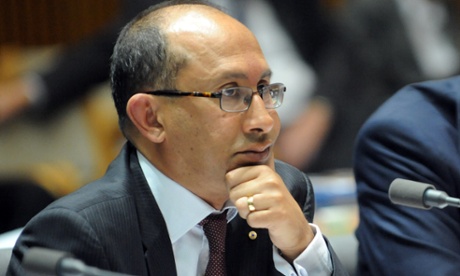‘This is a significant outbreak and Australia wishes to do its part in helping to deal with it,’ says Peter Varghese, the head of Dfat

Australia has established a super-committee encompassing senior members of several public service departments to help tackle the spread of the Ebola outbreak.
The Interdepartmental Committee (IDC) is headed up by the Department of Health and Department of Foreign Affairs and Trade (Dfat), and includes representatives from Defence, Immigration, Agriculture, Treasury, Finance, the Department of Prime Minister and Cabinet and Emergency Management Australia.
“This is a priority for the government, and therefore a priority for [Dfat]. [This] is a significant outbreak and Australia wishes to do its part in helping to deal with it,” the head of Dfat, Peter Varghese, told a senate estimates committee on Thursday.
“I think we’ve been able to devote the resources we need to devote to it up to this point and if there is a requirement to put even more resources into it, I expect we will be able to do it.”
Labor and the Greens have criticised the government for its reluctance to send Australian medical teams to West Africa to help contain the outbreak.
Dfat said the government was still working through the issues around deployment.
“The fact that we have not yet announced any assistance on, for instance, sending medical teams is not the same as saying we’ve decided not to send practical assistance,” Varghese said.
The IDC has been working through issues associated with deployment, like safety, transport, food, accommodation and other logistics, since August.
The federal government has allocated $18m in funding to help the international efforts to stop the spread of the disease. Of that, $3.5m has gone to the World Health Organisation (WHO) and $2.5m to NGOs. The organisations that have already received money are World Vision, Save the Children, Caritas and Plan International.
A further $2m was requested and given to the British government to support the delivery of “frontline services in Sierra Leone, through the UK government”, said Dfat’s Ewen McDonald.
Australia is also one of only two countries to have given money to the UN trust fund on Ebola. The request for funding was made directly by the UN secretary general, Ban Ki-moon.
Australia is currently the chair of the UN security council.
Dfat has told the senate estimates committee that the public service can absorb additional funding requests.
“It’s possible the government may want to do more. That’s up to the government to decide, and whatever they decide will be funded from within the [existing] humanitarian program.”
Several countries, including the source country of the outbreak, Sierra Leone, have asked Australia for help.
“Requests have come in for both financial support and other assistance like personnel and protective equipment,” co-chair of the IDC, Brett Exell, said.
